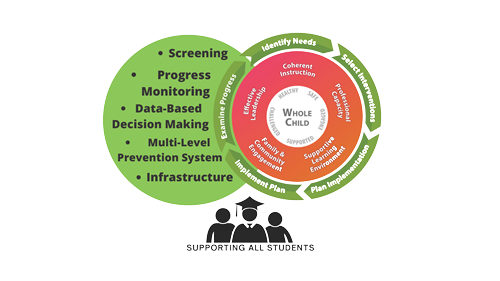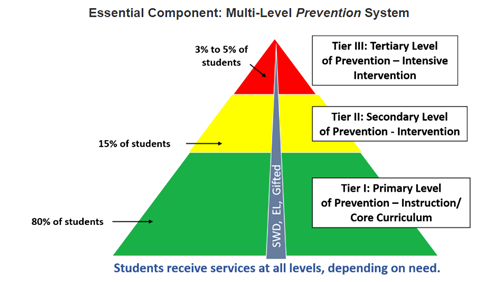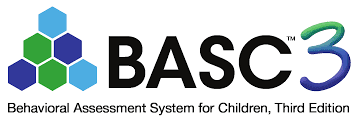MTSS
Multi-Tiered System of Support


What is MTSS?

Mutli-Tiered System of Supports (MTSS) is a proven practice to help schools identify and address the needs of every student to ensure all students learn at high levels. This is accomplished through ensuring high-quality universal core instruction and assessment, adapting instruction to fit those students' individual needs, and then monitoring student progress.
What are the tiers?
Tier 1
In Tier 1, universal or primary approaches that are preventative in nature are put into place (Sugai & Homer, 2002). These approaches are used at high levels in the classrooms for maximum prevention effect, and include the development of school-wide expectations, a behavioral matrix, and reinforcement systems to reward desired social behavior.
Tier 2
In Tier Two, targeted, group-based interventions are designed to serve students who have not responded to Tier One interventions. The 10-15% of students in Tier Two are considered at-risk for more severe behavioral problems and/or academic deficits (Lewis & Sugai, 1999; Sugai & Horner, 2002).
Tier 3
In Tier Three, tertiary interventions are used with students unresponsive to Tier One and Tier Two interventions. Generally, about 5% of the school population needs these individualized intensive services.
How does the process support scholars?
A multi-tiered system of supports is a process that provides high-quality, evidence-based instruction based on learner needs. Student needs are identified by monitoring students' progress over time. Adjustments to instruction and interventions are based on students' performance and rate of success. MTSS promotes a well-integrated system, connecting general, gifted, and special education with intervention and enrichments services. MTSS provides high-quality, standards-based instruction and intervention that is matched to students' academic, social, and behavioral needs.
the MTSS/RTI process, the Intervention Specialist:
Gathers data from universal assessments and historical data to identify students with Reading, Math, and Behavioral deficits.
Parents of newly identified students receive a letter from the Intervention Specialist regarding student deficit areas.
Students receive a Student Support Team (SST) plan with a prescribed amount of intervention time (minutes and days per week) and a goal based on the data gathered.
During intervention time, students receive support with teacher facilitated small/micro group support, as well as independent practice time 2 to 3 times per week according to SST plan.
Students are then probed weekly or biweekly depending on deficit area and levels to measure growth in their deficit areas and determine if the intervention is effective.
Probes are monitored by the intervention specialist for 6-8 week periods to determine effectiveness.
Intervention Specialist meets with teachers monthly to discuss student data, intervention effectiveness, and next steps.
If a probe is not effective, the intervention specialist will change the probe source, goal, or amount of time student receives the intervention. If the probe proves to be effective, the intervention specialist will continue the current plan and modify student plans accordingly after goal is reached.
Intervention Specialist along with Student Support Team (teachers, counselors, SELT, and administrator (as needed)) meet with parents of Tier 3 intensive support students every 6-9 weeks to discuss student data, classroom progress, intervention effectiveness and next steps.
All teachers are required to attend Tier 2 student meetings by grade level each month. In this meeting, the interventionist specialist will meet with teachers to discuss student progress in each class, interventions used, attendance, parent contact attempts, effectiveness of the interventions.
The Assessment for Atlanta Public Schools is Measures of Academic Progress (MAP). Students in grades 1-12 are administered the MAP Growth Assessment. The behavior assessment is the BASC-3.
- MAP Assessment is administered 3 times per year (Fall, Winter, and Spring):
- Fall Administration: Reading August 9-12, 2022 and Math August 15-19, 2022
- Winter Administration: Reading November 4-11, 2022 and Math November 13-17, 2022
- Spring Administration: Reading March 6-10, 2023 and Math March 13-17, 2023
previous

H.A.E.S MTSS
Parent Information
Fall Semester 2022
What is Required to Improve Outcomes for Students?
In order to be successful, everyone must be involved in the process (parents, teachers, administrators, community members etc.)
- The framework improves response times and helps educators rapidly respond to student needs.
- The framework aligns teams and school systems, helping to streamline information and resources necessary to improve student learning.
- ALL students are screened to identify those who may be at risk for poor academic or behavioral outcomes.
- Progress monitoring provides information that allows teachers to better target student needs and appropriately match instruction, resources, and supports.
- Parents should review screening data, report cards, and all school work.
How Families can get INVOLVED
- Frequently communicate with your child's teacher.
- Attend school functions such as parent-teacher conferences.
- Monitor and assist with your child's homework assignments.
- Find out what skills and knowledge your child is expected to learn.
What happens if my child is recommended for additional support?
- Attend team meetings. Remember the importance of your voice in your child's education.
- Help plan interventions for academic and/or behavioral needs.
- Practice and reinforce any strategies or educational plans at home.
- Ask questions
H.A.E.S MTSS
Christina Miller is a veteran teacher. She has worked in the Douglas cluster since 2005. She holds a B.A. from Spelman College and a Master's from Arkansas State University.
chmiller@apsk12.org
(404) 802-8500

